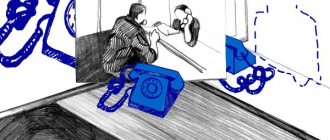There are many “suits” (castes) in the “youngster”. Every prisoner knows his place. You can rise to the highest suit only from the first four. 1) “Thieves”, 2) “Thiefs”, 3) “Third Table”, 4) “Boys”, 5) “Forshmaki” (who committed an offense out of ignorance), 6) “Devils” (thieves from their own), 7) "Shortfalls" ("those who are gutted"), “Washerwomen” (I think it’s clear), 9) “Sniffs” (servants), 10) “Goats” (informers), 11) “Butter presses” (jerk off others’ penises), 12) “Roosters” (passive homosexuals).
Each juvenile colony has its own names and rules regarding castes.
I mentioned above that you can “go down” at any time. It’s a shame to do many things when you’re young. For example, I went to the toilet and did not wash my hands. If you finish smoking after a lower suit, you’ll become like that yourself. Fallen objects must not be picked up. Especially a toothbrush, cigarettes, and soap in the bathhouse. Normal prisoners eat black bread and tea. Especially dry. You will also “get down” if you mend your socks. The teacher can “put you down” - for violation of discipline, he will transfer you from a decent sleeping place to the “devils” at the exit or to the “urinators” who are peeing.
The thieves can fuck you by finding fault with your words. In this area, by the way, in the bathhouse they washed with two washcloths: one up to the waist, the other below. You can’t make the mistake of calling a waffle towel a “waffle” (“waffle” means a blow job). You should say: “checkered towel.” Even in sleep you cannot relax. If you lower your hand from the bed below the elbow, they will call you “the devil.”
Nowadays, insanity has become a little less. But more recently, idiocy has reached extremes. Until 1991, prisoners had a negative attitude towards Soviet power. “Komsomolets” and “communist” meant curse words among prisoners. The power was red, and the youngsters did not recognize this color. You couldn’t smoke Prima because the pack was red. Even if the mother came to a date in a red sweater, the son refused the meeting. Then he was worried, of course, but didn’t show it. These concepts disappeared after the regime change in the country.
In some places, minors still have ridiculous customs regarding certain items, especially food. There is even a whole set of one-size-fits-all rules. (“Lard and butter are a waste. Sausage looks like a dick. Cheese stinks of mandiantine. Chicken was trampled by a rooster. Bread was raised by communists. Potatoes were trampled on by cops. Water was pissed on by fish.”) And so on for all food products. This is, of course, more of a joke. But in the colony described above, the juveniles do not eat barley porridge: the chaff is considered rooster food. And they don’t eat cabbage; cabbage is goat food.
Those castes that belong to the “high society” have the hardest time of all. Those who are lower than the “boys” are degraded. Touch them and they will run to complain, even to headquarters, bypassing the activists of their squad. Only the “boys,” in order not to be branded as “drayers” (sneaks) and not lose face, endure bullying. They are afraid to get involved with lower suits because of their vindictiveness. After all, they have nothing to lose. They do the dirty tricks. You can, having offended such a person in the evening, wake up in the morning with a “pumping device” (a plunger for punching toilets). This is enough to be considered “offended”. Or they’ll throw a mop in your face.
Naturally, this does not apply to activists. The obstinate ones who encroach on the authority of the activists will be beaten and may have their heads thrown into the toilet.
Because of such procedures, the entire special contingent constantly lives in tension. Youngsters develop neuroses and psychoses.
One thing is strange: the areas for minors are called educational colonies. Is it possible that the administration of these institutions, by creating such living conditions for the wards, hopes that it will contribute to their re-education?
"Crime and Punishment"
Failure to comply with the norms of prison law will not pass without a trace for any of the prisoners. It does not matter whether the prisoner belongs to the prison “elite” or is part of the most disreputable group of “inmates.”
Read also: Find out how to win at tic-tac-toe
For violating the established rules, the guilty convict (the one who “messed up”) may be subject to:
-Beating.
- A blow to the ears (to hit the ears means to transfer a prisoner from the “thieves’ caste” to a lower one, that is, to the category of “men”). This can only be done by a thief in law or a convicted person with the same status.
- Fractured limbs - arms and legs are broken, as a rule, by persons who have not repaid a gambling debt (and he is considered a saint in the zone), as well as by those who, without any reason, beat up a cellmate.
— A violent act of sodomy, after which the prisoner automatically falls into the most despised “caste of the debased”; This type of punishment is widespread in places of deprivation of liberty where juvenile offenders are serving sentences, as well as in general regime zones. In high-security and special-security prisons, these cases are extremely rare.
- A symbolic act of sodomy (in the zone this expression is replaced by the concept of “paraffin” and consists of passing the genital organ across the lips of the offender). The sexual act itself does not occur, but the convicted person is also transferred to the category of “roosters”.
Sometimes it happens
The above-mentioned suits are available in all zones and prisons. However, some places of detention have their own specific, so-called intermediate castes.
There are especially many such castes in the zone where juvenile criminals are kept. On the “youngster”, in addition to the castes already indicated, there are such suits as:
- “forshmaki”, which includes prisoners who have committed some minor offense in the zone due to ignorance of the rules and norms of behavior;
- “devils” - that is, those prisoners who were caught stealing from their cellmates;
- “shnyri” who act as servants;
- “laundresses”, “oil presses”, “shortages” and others.
In some adult zones, unique podcasts are common. For example, “thieves”, which includes prisoners who form the “retinue” of the “thieves” (while they themselves are not criminals). Or the “scoundrels” caste, which includes “thieves” prisoners who have committed some disgusting act.
“Be careful with Lyusya, her father is an enemy of the people”
If the child’s parents were arrested when he was no longer an infant, his own stage awaited him: wandering around relatives (if they remained), a children’s reception center, an orphanage. In 1936-1938, the practice became common when, even if there were relatives ready to become guardians, the child of “enemies of the people”—convicted under political charges—was sent to an orphanage. From the memoirs of G.M. Rykova: “After the arrest of my parents, my sister and grandmother and I continued to live in our own apartment <...> Only we no longer occupied the entire apartment, but only one room, since one room (father’s office) was sealed, and the second was still with us An NKVD major and his family moved in. On February 5, 1938, a lady came to us with a request to go with her to the head of the children's department of the NKVD, supposedly he was interested in how our grandmother treated us and how my sister and I generally lived. Grandmother told her that it was time for us to go to school (we studied in the second shift), to which this person replied that she would give us a ride in her car to the second lesson, so that we would take only textbooks and notebooks with us. She brought us to the Danilovsky children's home for juvenile delinquents. At the reception center we were photographed from the front and in profile, with some numbers attached to our chests, and our fingerprints were taken. We never returned home."
“The day after my father was arrested, I went to school. In front of the whole class, the teacher announced: “Children, be careful with Lyusya Petrova, her father is an enemy of the people.” I took my bag, left school, came home and told my mother that I wouldn’t go to school anymore,” recalls Lyudmila Petrova from the city of Narva. After the mother was also arrested, the 12-year-old girl, along with her 8-year-old brother, ended up in a children's reception center. There they had their heads shaved, fingerprinted and separated, sent separately to orphanages.
Illustration: Sergey Titov / RIA Novosti, archive
The daughter of army commander Ieronim Uborevich Vladimir, who was repressed in the “Tukhachevsky case,” and who was 13 years old at the time of her parents’ arrest, recalls that in foster homes, children of “enemies of the people” were isolated from the outside world and from other children. “They didn’t let other children near us, they didn’t even let us near the windows. No one close to us was allowed in... Me and Vetka were 13 years old at the time, Petka was 15, Sveta T. and her friend Giza Steinbrück were 15. The rest were all younger. There were two little Ivanovs, 5 and 3 years old. And the little one called her mother all the time. It was pretty hard. We were irritated and embittered. We felt like criminals, everyone started smoking and could no longer imagine ordinary life, school.”
In overcrowded orphanages, a child stayed from several days to months, and then a stage similar to an adult: “black raven”, boxcar. From the memoirs of Aldona Volynskaya: “Uncle Misha, a representative of the NKVD, announced that we would go to an orphanage on the Black Sea in Odessa. They took us to the station on a “black crow”, the back door was open, and the guard was holding a revolver in his hand. On the train we were told to say that we were excellent students and therefore we were going to Artek before the end of the school year.” And here is the testimony of Anna Ramenskaya: “The children were divided into groups. The little brother and sister, having found themselves in different places, cried desperately, clutching each other. And all the children asked them not to separate them. But neither requests nor bitter crying helped. We were put into freight cars and driven away. That’s how I ended up in an orphanage near Krasnoyarsk. It’s a long and sad story to tell how we lived under a drunken boss, with drunkenness and stabbings.”
Children of “enemies of the people” were taken from Moscow to Dnepropetrovsk and Kirovograd, from St. Petersburg to Minsk and Kharkov, from Khabarovsk to Krasnoyarsk.
Prison "castes"
There are no prisoners who do not belong to one of the categories of prisoners. All persons held in places of deprivation of liberty are conventionally divided into groups or, as the prisoners themselves say, “castes”. A transition from a privileged category to a lower category is possible (for example, in connection with the commission of any act that prison concepts and laws, the behavior of prisoners classifies as a “jamb”). But the transition from lower to higher is excluded.
Read also: How to make wavy hair in a bob
So, there are four main prison “castes”:
- thieves;
- men;
- goats;
- outcasts.
The first “caste” is the thieves. These are the so-called experienced professional criminals. Representatives of this group themselves do not call themselves thieves, but use such concepts as “lads”, “prisoners”, “tramps”, “travelers”.
This group is the top of the hierarchy, and not everyone can get into it. There are strict requirements for prisoners belonging to this “caste”. Thus, anyone who held leadership positions in freedom, had any connection with government structures, or served in the army will never become a “vagabond.” Those who worked in the service sector (for example, as a waiter, delivery person, taxi driver) will not be included in the “caste.”
Several decades ago, the “thieves,” while free, did not have to work a single day. They were also forbidden to marry or perform compulsory work in the zone. Currently, these requirements are not enforced in most prisons.
In addition to a “clean” biography and the status of a professional criminal, a prisoner who wants to get into this “caste” must comply with absolutely all prison concepts, laws, and traditions.
The thieves have enormous power in the zone and in prison (or as the prisoners themselves say, “in prison”). They are the ones who resolve all conflict situations and disputes that arise between prisoners and ensure that none of the convicts are unreasonably offended or humiliated.
Representatives of this group also have special privileges. So, they may not work and independently decide what from the so-called common fund they can keep for themselves.
It is from this “caste” that the “godfather”—the leader in the zone—is selected. Moreover, if there is a recognized “thief in law” in prison, then he must occupy the specified “position”. By the way, “thieves in law” are a privileged, top group of prisoners. It includes only lawbreakers recognized by the criminal world who meet all of the above requirements.
If there is no thief in law in the zone, then the person performing his duties, that is, the “supervisor,” is sent there. He performs all the functions of a “godfather”.
Currently, in some places of deprivation of liberty, the so-called godfathers secretly cooperate with the administration of the colony: they establish such order in the zone as is necessary for the management. The administration of the colony turns a blind eye to many things for such cooperation: for example, to the fact that vodka, marijuana, and so on get to the “boss”.
It is worth noting that the development of market relations in the country has not bypassed the place of imprisonment. Recently, you can become a thief in law for money, that is, you can buy this title. And, despite the fact that prison concepts and laws of clarity do not fit in with this fact, it is still impossible to exclude it. Such newly minted and not very ideological thieves in law are called “oranges.”
It’s better not to get involved with the “thieves” and “watchers”!
There are no universal tips on how to behave behind bars. No matter how trite it sounds, a lot depends only on you.
As you approach the zone, remember that in Russia there are no longer those professional criminals you saw on TV. It doesn't really matter which colony you arrive in. Behave like a man and you will live normally.
Having been on all sorts of “business trips”, I will say that I even like the “Makhnovist” zones. Yes, on the one hand, there is terrible chaos going on there, and on the other hand, normal people feel good, not talkers and opportunists.
Just like “registration” for youngsters, lawlessness is not such a stupid thing. In the Makhnovist zone, you are severely beaten by prisoners in quarantine. But even a beating can be endured with dignity - without whining, without begging for mercy, and without breaking down and complaining to the cops. Then they will leave. Give me any slack and they will press you for the entire term. This “natural selection” is even fair in some ways.
But let’s say you are going to an ordinary colony (they are now all mixed: there is enough “redness” for the “blacks”, and “blackness” for the “reds”).
First, immediately understand that correctional labor institutions are a village. Let all the prisoners in it be city dwellers, but due to the limited space and communication they are likened to villagers in their worst manifestations. They get used to gossiping, living in trifles, trying to know everything about their neighbors. Many convicts cease to observe etiquette, decency, and hygiene.
So if you meet a good friend of yours in the zone, remember that he was good in the wild. Here the environment forces a person to survive. Be careful: it is unknown what kind of rot will come out of it.
Arriving at the colony, I met my best friend from my youth, who had already served there for two years. While I was in quarantine, I gave him my things to keep, and in order to “get off my dick” and pay off his gambling debts, he sold them. Then he completely refused that I gave him anything...
When meeting with an acquaintance, refer to poor health and promise that you will talk later. In a short time, you will find out exactly how many “jambs he broke” (committed nasty acts) during the term.
I am writing this with normal people in mind. So we will assume that your goal is to be released early.
To do this, it is best to get a job in an industrial zone. Just not for the position of foreman, storekeeper, commandant, but as a simple worker. And live in peace. Don't conflict with cops and prisoners. Don't become a leader needed by the administration. Otherwise, the court for parole will even write you an excellent reference so as not to spoil the relationship, but they themselves will ask the judge, and he will not let you go. And the employees will sigh hypocritically and sympathize with you in every possible way...
Take your time with the work. The time limit is long: the main thing is not to make mistakes. I do not recommend holding the position of detachment caretaker, head of a canteen, bathhouse, club, work assistant, or section activist. The prisoners don't like them, and the cops are quite annoying.
It’s also better not to get involved with the “thieves” and “watchdogs”. No, if in freedom you hung around the “khazas” and “raspberries”, played cards and are a fan of the criminal world, then, of course, go to the “supervisors”. But this group also cruelly punishes its own for misdeeds or weakness - they can break you. And the employees, although they use them, do not let them go early.
It’s difficult to give other advice without knowing the person. In one hungry zone, someone eats in a garbage dump and sleeps in an overcrowded, dirty section on the fifth tier under the ceiling. At the same time, in the industrial zone, another prisoner has an office with a landline telephone, a bedroom, a greenhouse, a gym, a shower, and his food is delivered to him from a restaurant.
Or in the “red” zone, the cops beat me up throughout the quarantine, but from the first day they communicated with me on first-name terms.
I met hucksters in the colony whose monthly income was several thousand dollars, but in the wild they were plump from hunger.
It happens that the authorities behind bars have power, several servants (not the stupidest prisoners), with one word the destinies, life and death of the prisoners are decided, and when free they lie in a ditch and dogs piss on them. So in captivity it depends only on you who and how you will live.
"Roosters" or "drooped"
The lowest caste in the prison hierarchy. Not to say that they are numerous in percentage terms with other stripes, but the “low-down” can also include the down-at-heel convicts – “stuff” who don’t take care of themselves, aren’t washed, are dirty dressed. “Chushko”, like “roosters”, are shunned in the zone and their place is often also near the bucket. "Rooster", strictly speaking, is a passive homosexual. Either a “blue” (regardless of the active-passive position), who came as such from the outside, or an “offended” one already in the zone. The “roosters” do not have any rights in the zone; they are outcasts, from whom the other inmates try to distance themselves as much as possible - the “blues” have their own dishes with a hole and their own place closer to the toilet. All the dirty work in captivity - washing toilets, maintaining garbage pits and much more - is done by the "lowered". The word “rooster” and its related words - “chicken”, “chicken coop”, “comb” and all the others that are in some way connected with this bird - are very offensive towards a particular convicted person, they immediately require accountability , otherwise this status, just like with the “goat,” may stick to the prisoner, and irrevocably.
How to communicate with guards
Now let's talk about the employees in the colony. Do not trust them in anything, especially the officers. Over all the years spent behind bars, I saw hundreds of “citizen bosses”, and I got the strong impression that in special educational institutions they are taught to lie to convicts. In order to achieve momentary gain, so that the prisoner will do as they need or leave them behind, they make promises and easily swear by their shoulder straps. So the employees of the penitentiary system (and the Ministry of Internal Affairs too) should be treated like a radio - you can listen to them, but you cannot ask them.
In my opinion, very dishonest people work in the zone: the chief, the deputy chief for security and operational work (that is, the head of two departments - security and operational), each of them has their own bosses, deputies, senior and ordinary employees. Next - Deputy Head for Personnel and Educational Work. The educational department includes the heads of the detachments. Then - the deputy for the rear (business manager) with his staff, a special department, psychologists, sociologists, doctors.
In the correctional system, the old tried and tested method of “divide and conquer” is practiced. The head of the colony and his deputy for the budgetary regulation have different “roofs” in the Department of Execution of Punishments and snitch on each other. In turn, other deputies, heads of departments and their subordinates “lead” information to the government about them and their colleagues. So even though the cops are doing a common cause, they are quietly at odds with each other. Interspecies fight!
The “owner” does not always dominate the zone. By virtue of his position, he is in charge, but if his “roof” and his own head have become weak, then power can pass into the hands of any tenacious deputy.









